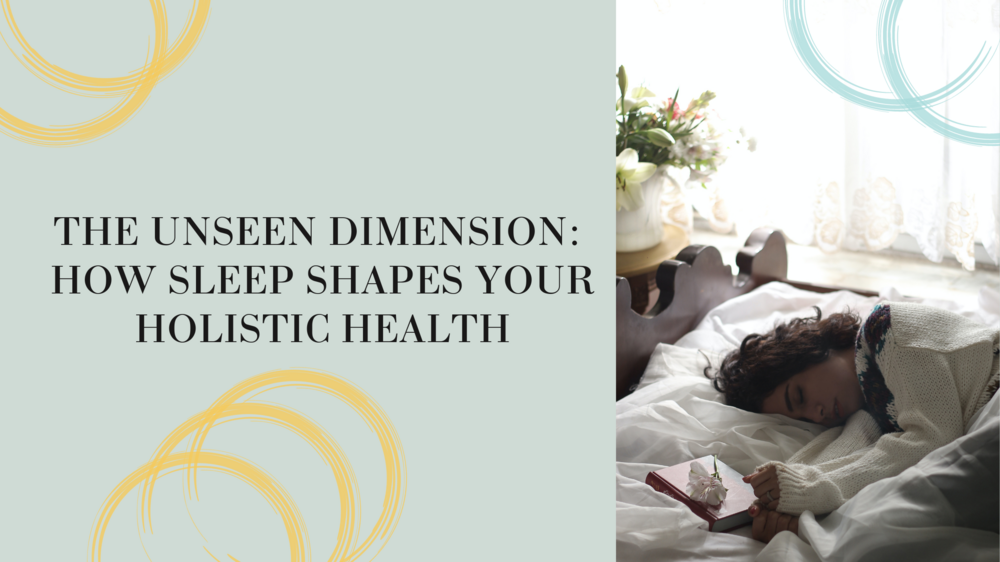This post may contain affiliate links, which means I may earn a commission if you click on the link and make a purchase. Be assured that I only recommend products that I have thoroughly researched and believe will add value to you.
In the quest for holistic well-being, we often focus on aspects such as nutrition, exercise, and mindfulness. While these are undoubtedly important, one vital element tends to be overlooked: the quality of our sleep. On average, we spend about one-third of our lives sleeping, around 25 years on a 75-year lifespan. According to the Centers for Disease Control, about 1 in 3 adults in the United States reports not getting enough rest or sleep daily. The National Heart, Lung, and Blood Institute reports, “… an estimated 50 to 70 million Americans have chronic, or ongoing, sleep disorders.”
Sleep deficiency can lead to physical and mental health problems, injuries, loss of productivity, and even a greater likelihood of death.” The prominence of sleep and its mammoth role in shaping our holistic health remains vastly underrated.
Are we taking it lightly? Certainly, we’re living in an era where everyone is racing, sometimes even showing off how little they sleep, like it’s some sort of achievement — the epitome of the “hustle culture.” However, the narrative needs to change, and sleep must be restored to its rightful place and addressed openly. Sleeping is no longer just a passive, dull phase that we all need to “get through” to wake up fresh; it’s an active, significant state that impacts our cognitive, physical, and emotional health.
This article explores those unseen dimensions of sleep that unconsciously shape your holistic health.
The Science of Sleep
Understanding the role of sleep in holistic health begins with grasping the science behind it. Now, imagine sleep as a grand theatrical production split into acts and scenes. Throughout the night, we go through different sleep cycles, a dynamic process comprising various phases, including Rapid Eye Movement (REM) and non-REM phases. These stages play a crucial role in maintaining overall health.
The circadian rhythm, often referred to as our internal body clock, regulates our sleep-wake cycle. It’s our built-in 24-hour internal clock running in the background, controlling our sleep-wake cycles. If you’ve noticed feeling energetic or sleepy around the same time daily, that’s your faithful, ever-punctual Circadian Rhythm hard at work. It influences our alertness, hormone production, and other essential functions. Research has affirmed that disruptions to this rhythm can significantly impact our well-being, and “many disease states may be caused or exacerbated by exposure to circadian misalignment.” Perhaps we should start thinking about this differently as we go about our daily activities.
Physical Health Benefits of Sleep
Quality sleep is closely associated with physical health. For instance, a robust immune system relies on adequate rest. A study on Sleep Loss and inflammation affirms that during deep sleep, the body produces cytokines, proteins that help combat infections, while chronic sleep deprivation, on the other hand, has been linked to a higher risk of future development of chronic diseases like diabetes and heart disease.
Additionally, sleep plays a role in weight management. While a good night’s sleep may help maintain a healthy weight, poor sleep can disrupt the balance of hunger-related hormones, leading to increased appetite and potential weight gain. More recent evidence suggests that “given the importance of sleep in maintaining energy homeostasis,… promoting good sleep hygiene may create new avenues for obesity prevention and treatment.”
Mental Well-Being and Sleep
There is a profound correlation between sleep and mental health. It’s not just about feeling groggy after a sleepless night; it can impact mood, stress management, and cognitive function. When you’re sleep-deprived, conjuring up the next big idea or making a critical decision could be as tricky as finding a unicorn. Your alertness, attention, creativity, and decision-making skills can get out of whack.
Research shows a good night’s sleep can help regulate emotions and improve mental resilience. Moreover, the effects of sleep on cognitive function are well-documented. A restful night contributes to better concentration, problem-solving, and memory retention. When you sleep, your brain is busy consolidating memories and cleaning out unnecessary information that can impair cognitive function.
Sleep and Emotional Balance
Achieving emotional balance is vital for overall well-being, and sleep is a cornerstone of this equilibrium. Sleep is directly connected to emotional regulation, and disturbances in sleep patterns can lead to mood disorders like depression and anxiety and even trigger post-traumatic stress Disorder (PTSD). It’s essential to address sleep when dealing with emotional health. Introducing mindfulness practices, such as meditation, into your evening routine can help you relax and prepare for a restful night’s sleep.
Sleep Hygiene Practices
Ensuring the quality of your sleep involves practicing good sleep hygiene. Here are some tips to help you improve your sleep:
- Create a Sleep-Conducive Environment: Ensure your bedroom is dark, quiet, and cool. Invest in a comfortable mattress and pillows.
- Limit Screen Time: The blue light emitted by screens can disrupt your circadian rhythm. Try to put away screens at least an hour before bed.
- Maintain a Consistent Sleep Schedule: Ensure you go to bed and wake up at the same time each day, even on weekends.
- Avoid Stimulants Before Bed: Caffeine and nicotine are known to interfere with sleep. Avoid them in the hours leading up to bedtime.
- Relaxation Techniques: Engage in calming activities like reading, practicing deep breathing exercises, or taking a warm bath.
Holistic Wellness: Integrating Sleep
Holistic wellness means considering all aspects of your health, including sleep. To truly embrace this approach, start by prioritizing sleep as critical to your well-being. When you integrate quality sleep with proper nutrition, regular exercise, and mindfulness, you’ll experience a profound positive impact on your overall health. Incorporate mindfulness practices like yoga or meditation to help relax your mind and body. These can be particularly beneficial before bedtime, helping you transition into a peaceful sleep.
Conclusion
In pursuing holistic well-being, we must recognize that sleep is an unseen dimension that significantly shapes our health. It is not a separate entity but an integral part of our overall wellness. Quality sleep can bolster physical health, enhance mental well-being, and promote emotional balance. Embrace a holistic approach to wellness by prioritizing your sleep. Create a sleep-conducive environment, practice good sleep hygiene, and consider mindfulness practices. By integrating sleep into your wellness journey, you can experience the benefits of a balanced and healthy life.
Additional Resources
For more in-depth information on the relationship between sleep and holistic health, consider these resources:
- National Heart, Lung, and Blood Institute – Sleep Deprivation and Deficiency
- National Center for Biotechnology Information – Sleep and the Immune System
- https://www.ncbi.nlm.nih.gov/pmc/articles/PMC3548567/
Author’s Note
As a wellness blogger, I’ve personally experienced the power of prioritizing sleep in my holistic approach to well-being. Integrating good sleep practices into my daily routine has enhanced my physical and mental health, and I hope this article inspires you to do the same.

